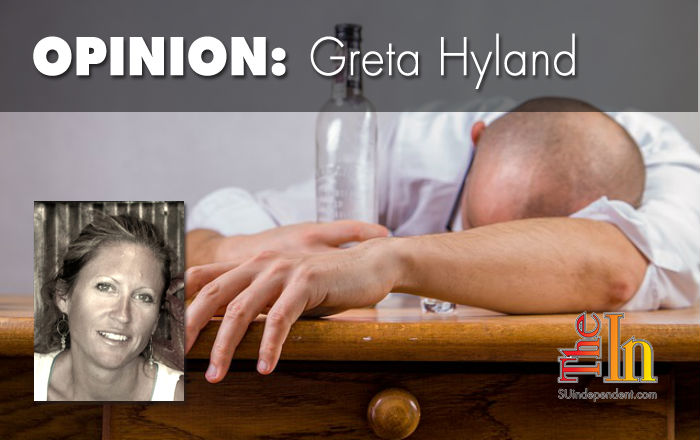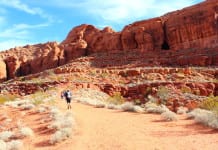OPINION: Controlling the market, creating scarcity, and alcohol poisoning in Utah

Written by Greta Hyland
In a recent article in the Salt Lake Tribune it was reported that Utah ranks among the nation’s lowest for alcohol consumption and binge drinking. That statistic is not all that surprising in light of the fact that 60 percent of Utahns are Mormons who do not drink. But very surprisingly, Utah ranks seventh highest in alcohol poisoning deaths according to the Center for Disease Control and Prevention. More interesting, however, is that the average age of those deaths is middle-aged men between the ages of 45 and 64.
One might wonder how Utah can have a low consumption and binge drinking rank but still have the most alcohol poisoning deaths. It’s because when Utahns binge drink, they drink more than the average people do in the high ranking, binge drinking states. Higher even than Wisconsin, which is often joked about as being a place where there is nothing else to do but drink.
So why such extremes?
I’m no expert, but I would wager it has something to do with the social stigma attached to drinking here. I would also say it has to do with the scarcity that Utah creates by not allowing competition in the market and the never-ending attempt to limit liquor stores and licenses.
This last week my family traveled to Montana for spring break. We took a Clark Griswold, National Lampoon-esque vacation, driving as far as humanly possible without killing each other. Missoula offers an interesting contrast to a place like St. George, which is very representative of the overall demographics in Utah. Missoula and St. George are roughly the same size in population. They both are surrounded by open space and a lot of public land. They both have a university. They are both outdoor recreational paradises. But that is where the similarities end.
Where St. George is spread out and the downtown is small and hardly used, Missoula is compacted with a vibrant and busy downtown. Where St. George is largely a new and developing town, Missoula is an old, pre-industrial town. Where St. George has Mormon churches everywhere, Missoula has bars, breweries, and liquor stores on every corner. These two towns could not have a more diametrically opposed character and feel to them.
Driving around Missoula, I got the impression that people really like to drink there. It actually was not a positive note in my mind and left me befuddled on a handful of occasions when we entered breweries that did not serve food. That being said, having an abundance of options actually lowered my desire to drink.
But I do like a good beer or glass of wine either with my dinner or after it, and having a variety of choices with abundant options was nice.
As we ventured out into the town, I noticed state liquor stores across the street from private liquor stores. Clearly the market can handle a lot of competition if all those liquor stores and bars stay in business.
I noticed people out and about walking, riding bikes, and coming and going in and out of the coffee shops and pubs. You were never alone. You got the sense that you were a part of a thriving community while you were there. As a side note, it has been rumored that the microbrew renaissance carried Montana through the Great Recession – which probably served both the economy and the well-being of the residents. Sometimes when everything in life stinks, a good beer with some good friends is all you need to keep your chin up. It was such a stark contrast from St. George.
I am not saying that one is better than the other, I only want to highlight the difference between a society that allows its citizens to decide for themselves if they want to drink and one that controls its citizens. I also want to point out the difference between a place that really implements competition in the market and one that does not. When the state controls all the liquor stores, that is not a free market economy. And after Utah legislators denied Telsa a showroom in Utah, it’s clear that liquor is not all the state controls in the market.
Does Utah’s monopolizing of the market, controlling it, and thus creating a scarcity mentality for those who drink lead to the excessive drinking that propels it into having one of the highest rankings of alcohol poisoning? I won’t go so far as to say it’s the only reason, but I would wager it has something to do with it. I will just base it on my own experience. In St. George, I do feel an urgency in getting the drinks I want because it’s not readily accessible and is always on the chopping block; whereas in a place like Missoula, I felt no need to hoard it because it was accessible, plentiful, and available all the time.
Interestingly, on Thursday, March 12, the legislature passed HB 48, which banned the sale of powdered alcohol, called “Palcohol.” Palcohol is a powdered alcohol that you mix with water. It got federal approval to be sold in stores, just one day before Utah banned it.
Mark Philips, the manufacturer, said he created the powder for backpackers who don’t want to pack heavy bottles of alcohol but still want to enjoy a good drink at the end of an adventure. It’s similar to beer manufacturers bringing back aluminum cans for the same demographic. It’s wildly popular.
So why is Utah, a backpacking-rich and pro-free market competition state, banning it? Apparently because it can easily be concealed and given to youths. That argument seems rather flimsy to me. Kids still get their hands on alcohol just like they still get their hands on guns, but we haven’t banned guns. And we’ve tried to ban alcohol, and we all saw how successful that was.
Just how much control can a state exert over something? Apparently in Utah, a lot.
But does it make much sense? I tend to agree with Abraham Lincoln on legislating desire. Lincoln said of prohibition, “Prohibition… goes beyond the bounds of reason in that it attempts to control a man’s appetite by legislation and makes a crime out of things that are not crimes… A prohibition law strikes a blow at the very principles upon which our government was founded.”
I understand that there are negatives to drinking alcohol, but the choice for good or for ill should be up to the individual, not the the state. When you create scarcity, you create a false sense of urgency. Not only that, when you take something away from people, it usually just makes them want it more.
Or else you create a black market for it, which the Palcohol manufacturer believes will happen in states that have banned his product.
But beyond that, maybe if our youth witnessed responsible drinking from adults who didn’t feel stigmatized or that the state could make it illegal or even harder to come by, everyone might drink more responsibly. Just a thought.




